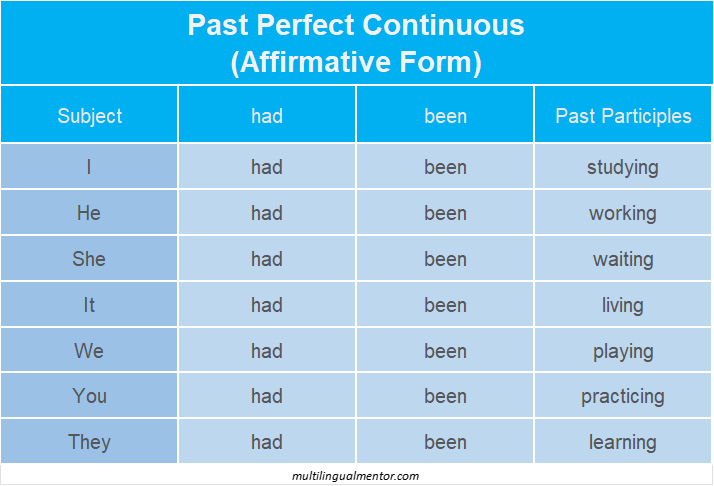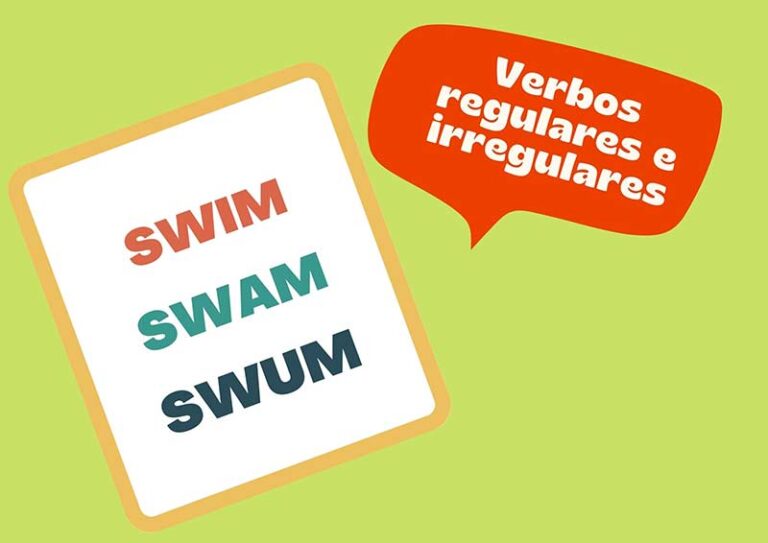Past Perfect Continuous | Tu Guía para el Inglés Fluído
Introducción
¡Hola! Hoy vamos a explorar uno de los tiempos verbales más interesantes en inglés:
El “Past Perfect Continuous” o “Pretérito Pluscuamperfecto Continuo.” Este tiempo verbal puede parecer un poco complicado al principio, pero una vez que comprendas sus reglas y usos, te darás cuenta de que es una herramienta poderosa para hablar de acciones pasadas que se desarrollaron durante un período específico en el pasado.
1. Definición
El “Past Perfect Continuous” se utiliza para hablar sobre una acción que comenzó en el pasado y continuó hasta otro punto en el pasado. Es una combinación del “Past Perfect” (Pretérito Pluscuamperfecto) y el “Present Continuous” (Presente Continuo) en inglés.
2. Cuándo usarlo
El “Past Perfect Continuous” se utiliza en situaciones específicas en las que queremos destacar la duración de una acción en el pasado. Algunos casos comunes en los que lo usaríamos son:
- Para hablar sobre una acción que se desarrolló durante un período de tiempo antes de otra acción en el pasado.
- Para enfocar nuestra atención en la duración de una acción pasada.
- Para establecer una conexión entre dos momentos específicos en el pasado.
3. Estructura del “Past Perfect Continuous”
Veamos cómo se estructura el “Past Perfect Continuous” en sus formas afirmativa, negativa e interrogativa.
Forma Afirmativa
Sujeto + Had + Been + Verbo en Gerundio (-ing)
Forma Negativa
Sujeto + Had + Not + Been + Verbo en Gerundio (-ing)
or:
Sujeto + Hadn’t + Been + Verbo en Gerundio (-ing)
Forma Interrogativa
Had + Sujeto + Been + Verbo en Gerundio (-ing)
Pregunta Negativa
Hadn’t + Sujeto + Been + Verbo en Gerundio (-ing)
WH Question
WH + Had + Sujeto + Been + Verbo en Gerundio (-ing)
4. Ejemplos del “Past Perfect Continuous”
4.1 Forma Afirmativa

- She had been studying English for two years before moving to London. (Ella había estado estudiando inglés durante dos años antes de mudarse a Londres.)
- They had been working at the company since 2010. (Ellos habían estado trabajando en la empresa desde 2010.)
- I had been practicing the piano for hours before the concert. (Había estado practicando el piano durante horas antes del concierto.)
- We had been waiting for the bus when it started to rain. (Habíamos estado esperando el autobús cuando comenzó a llover.)
- She had been learning French for several months before traveling to Paris. (Ella había estado aprendiendo francés durante varios meses antes de viajar a París.)
- They had been living in that city since they were children. (Habían estado viviendo en esa ciudad desde que eran niños.)
- He had been working on that project for weeks before presenting it to the team. (Había estado trabajando en ese proyecto durante semanas antes de presentarlo al equipo.)
- The kids had been playing in the park all afternoon. (Los niños habían estado jugando en el parque toda la tarde.)
- By the time they arrived, I had been waiting for an hour. (Para cuando llegaron, había estado esperando durante una hora.)
- The team had been practicing hard before the championship game. (El equipo había estado practicando duro antes del partido del campeonato.)
- She had been studying medicine for five years when she decided to specialize in surgery. (Ella había estado estudiando medicina durante cinco años cuando decidió especializarse en cirugía.)
- We had been watching the movie for half an hour before the power went out. (Habíamos estado viendo la película durante media hora antes de que se fuera la luz.)
- The company had been growing steadily before the economic crisis hit. (La empresa había estado creciendo constantemente antes de que golpeara la crisis económica.)
- They had been traveling around Europe for three months before returning home. (Ellos habían estado viajando por Europa durante tres meses antes de regresar a casa.)
- By the time he finished the marathon, he had been running for five hours. (Para cuando terminó el maratón, el había estado corriendo durante cinco horas.)
- She had been writing her novel for years before it finally got published. (Ella había estado escribiendo su novela durante años antes de que finalmente se publicara.)
4.2 Forma Negativa

- He had not been watching TV all day. (Él no había estado viendo la televisión todo el día.)
- She had not been working at that company for long before she decided to quit. (Ella no había estado trabajando en esa empresa por mucho tiempo antes de decidir renunciar.)
- They hadn’t been studying Spanish before they moved to Spain. (Ellos no habían estado estudiando español antes de mudarse a España.)
- We hadn’t been traveling for more than a week when we ran out of money. (Nosotros no habíamos estado viajando por más de una semana cuando nos quedamos sin dinero.)
- He hadn’t been playing the guitar for very long when he performed in front of a big audience. (El no había estado tocando la guitarra por mucho tiempo cuando se presentó frente a una gran audiencia.)
- The children hadn’t been playing in the yard for more than a few minutes when it started to rain. (Los niños no habían estado jugando en el patio por más de unos minutos cuando empezó a llover.)
- They hadn’t been living in that city for many years before they decided to relocate. (Ellos no habían estado viviendo en esa ciudad por muchos años antes de decidir mudarse.)
- The team hadn’t been practicing enough before the important match. (El equipo no había estado practicando lo suficiente antes del partido importante.)
- She hadn’t been working on the project for very long when she realized she needed more data. (Ella no había estado trabajando en el proyecto por mucho tiempo cuando se dio cuenta de que necesitaba más datos.)
- By the time he finished his studies, he hadn’t been attending school for a month due to illness. (Para cuando terminó sus estudios, el no había estado asistiendo a la escuela durante un mes debido a una enfermedad.)
- We hadn’t been waiting for the train for too long before it arrived. (Nosotros no habíamos estado esperando el tren por mucho tiempo antes de que llegara.)
- They hadn’t been working on the project all night, as they took breaks to rest. (Ellos no habían estado trabajando en el proyecto toda la noche, ya que tomaron descansos para descansar.)
- The company hadn’t been expanding its operations before the recession hit. (La empresa no había estado expandiendo sus operaciones antes de que golpeara la recesión.)
- She hadn’t been studying for the test because it was postponed. (Ella no había estado estudiando para el examen porque fue pospuesto.)
4.3 Forma Interrogativa
- Had she been waiting for a long time? (¿Ella había estado esperando por mucho tiempo?)
- Had they been working on the project all night? (¿Ellos habían estado trabajando en el proyecto toda la noche?)
- Had you been practicing the guitar before the concert? (¿Tu habías estado practicando la guitarra antes del concierto?)
- Had you been waiting for the bus for a long time when it finally arrived? (¿Tu habías estado esperando el autobús por mucho tiempo cuando finalmente llegó?)
- Had they been working together on the project before they disagreed? (¿Ellos habían estado trabajando juntos en el proyecto antes de que se pusieran en desacuerdo?)
- Had she been attending the classes regularly before she missed yesterday’s session? (¿Ella había estado asistiendo a las clases regularmente antes de que faltara a la sesión de ayer?)
- Had you been practicing the dance routine before the dance competition? (¿Tu habías estado practicando la rutina de baile antes de la competencia de baile?)
- Had they been working together on the project before they disagreed? (¿Ellos habían estado trabajando juntos en el proyecto antes de que se pusieran en desacuerdo?)
- Had she been attending the classes regularly before she missed yesterday’s session? (¿Ella había estado asistiendo a las clases regularmente antes de que faltara a la sesión de ayer?)
- Had you been practicing the dance routine before the dance competition? (¿Tu habías estado practicando la rutina de baile antes de la competencia de baile?)
- Had they been working on the new project before they received additional funding? (¿Ellos habían estado trabajando en el nuevo proyecto antes de recibir financiamiento adicional?)
- Had she been taking the medication regularly before she started feeling better? (¿Ella había estado tomando la medicación regularmente antes de empezar a sentirse mejor?)
- Had he been attending the language classes before he switched to online learning? (¿El había estado asistiendo a las clases de idiomas antes de cambiar a la educación en línea?)
- Had they been working on the new project before they received additional funding? (¿Ellos habían estado trabajando en el nuevo proyecto antes de recibir financiamiento adicional?)
- Had she been taking the medication regularly before she started feeling better? (¿Ella había estado tomando la medicación regularmente antes de empezar a sentirse mejor?)
- Had he been attending the language classes before he switched to online learning? (¿El había estado asistiendo a las clases de idiomas antes de cambiar a la educación en línea?)
- Had you been learning Spanish before you moved to Spain? (¿Tu habías estado aprendiendo español antes de mudarte a España?)
4.4 Negative Questions – Preguntas Negativas
- Hadn’t you been learning French before you moved to France? (¿Tu no habías estado aprendiendo francés antes de mudarte a Francia?)
- Hadn’t he been saving money for the vacation? (¿El no había estado ahorrando dinero para las vacaciones?)
- Hadn’t they been playing football for hours? (¿Ellos no habían estado jugando fútbol durante horas?)
- Hadn’t she been living in that city for many years before she moved to another country? (¿Ella no había estado viviendo en esa ciudad por muchos años antes de mudarse a otro país?)
- Hadn’t the team been practicing hard before the championship game? (¿No había estado practicando duro el equipo antes del partido del campeonato?)
- Hadn’t they been traveling around Europe for several months before they returned home? (¿Ellos no habían estado viajando por Europa durante varios meses antes de regresar a casa?)
- Hadn’t he been working on the project for weeks before he presented it to the client? (¿El no había estado trabajando en el proyecto durante semanas antes de presentarlo al cliente?)
- Hadn’t the company been growing steadily before the economic crisis hit? (¿No había estado creciendo constantemente la empresa antes de que golpeara la crisis económica?)
- Hadn’t they been living in that neighborhood for a while before they moved to the countryside? (¿Ellos no habían estado viviendo en ese barrio por un tiempo antes de mudarse al campo?)
- Hadn’t he been studying for the test before he realized it was canceled? (¿El no había estado estudiando para el examen antes de darse cuenta de que fue cancelado?)
- Hadn’t you been saving money for the vacation before you decided to spend it on something else? (¿Tu no habías estado ahorrando dinero para las vacaciones antes de decidir gastarlo en otra cosa?)
- Hadn’t the children been playing in the park for a while before it started raining? (¿No habían estado jugando los niños en el parque por un tiempo antes de que empezara a llover?)
- Hadn’t they been living in that neighborhood for a while before they moved to the countryside? (¿Ellos no habían estado viviendo en ese barrio por un tiempo antes de mudarse al campo?)
- Hadn’t he been studying for the test before he realized it was canceled? (¿El no había estado estudiando para el examen antes de darse cuenta de que fue cancelado?)
- Hadn’t you been saving money for the vacation before you decided to spend it on something else? (¿Tu no habías estado ahorrando dinero para las vacaciones antes de decidir gastarlo en otra cosa?)
- Hadn’t the children been playing in the park for a while before it started raining? (¿No habían estado jugando los niños en el parque por un tiempo antes de que empezara a llover?)
Wh Questions with Past Perfect Continuous
- What had she been doing before she decided to take a break? (¿Ella qué había estado haciendo antes de decidir tomarse un descanso?)
- Why had they been working late every night for the past week? (¿Por qué ellos habían estado trabajando hasta tarde todas las noches durante la última semana?)
- Where had he been traveling before he arrived in Paris? (¿El dónde había estado viajando antes de llegar a París?)
- Who had they been waiting for at the train station before the train finally arrived? (¿Ellos a quién habían estado esperando en la estación de tren antes de que finalmente llegara el tren?)
- When had she been studying for the exam before she realized it was postponed? (¿Ella cuándo había estado estudiando para el examen antes de darse cuenta de que fue pospuesto?)
- What had they been discussing in the meeting before the manager arrived? (¿Sobre qué habían estado discutiendo ellos en la reunión antes de que llegara el gerente?)
- Why hadn’t he been answering his phone for the past few days? (¿Por qué el no había estado contestando su teléfono durante los últimos días?)
- How many hours had they been waiting at the airport before their flight was canceled? (¿Cuántas horas habían estado esperando en el aeropuerto antes de que cancelaran su vuelo?)
- Where had she been staying during her trip to New York City? (¿Ella dónde había estado alojándose durante su viaje a la ciudad de Nueva York?)
- Who had they been helping with the project before they ran out of time? (¿Ellos a quién habían estado ayudando con el proyecto antes de quedarse sin tiempo?)
- When had he been practicing the piano before his music teacher praised his performance? (¿El cuándo había estado practicando el piano antes de que su profesor de música elogiara su actuación?)
- What had they been eating before they realized the restaurant had a vegetarian menu? (¿Qué habían estado comiendo ellos antes de darse cuenta de que el restaurante tenía un menú vegetariano?)
- Why hadn’t she been feeling well for the past few days? (¿Por qué ella no había estado sintiéndose bien durante los últimos días?)
- How long had he been searching for a new job before he finally got an offer? (¿Cuánto tiempo el había estado buscando un nuevo trabajo antes de que finalmente recibiera una oferta?)
- What had they been discussing with their friends before the party started? (¿Sobre qué habían estado hablando ellos con sus amigos antes de que comenzara la fiesta?)
- How long had they been living in that house? (¿Ellos cuánto tiempo habían estado viviendo en esa casa?)
- How long had he been studying English before he moved to the United States? (¿El cuánto tiempo había estado estudiando inglés antes de mudarse a los Estados Unidos?)
- How long had she been working at the company before she got promoted? (¿Ella cuánto tiempo había estado trabajando en la empresa antes de ser ascendida?)
5. Respuestas cortas a las interrogativas
Para responder a preguntas hechas con el “Past Perfect Continuous,” podemos usar respuestas cortas.
Had they been studying? – Yes, they had. / No, they hadn’t.
¿Ellos habían estado estudiando? – Sí, ellos habían estado estudiando. / No, ellos no habían estado estudiando.
Had he been working? – No, he hadn’t.
¿El había estado trabajando? – No, el no había estado trabajando.

Past Perfect vs Past Perfect Continuous
Past Perfect
- Enfatiza acciones completadas antes de un punto específico en el pasado.
- Describe acciones que estaban terminadas antes de otro evento pasado.
Ejemplo:
She had studied for three hours before the exam. (Ella había estudiado durante tres horas antes del examen.)
Past Perfect Continuous
- Enfatiza la duración de una acción antes de un punto específico en el pasado.
- Describe acciones que estaban en curso antes de otro evento pasado.
Ejemplo:
They had been playing soccer for two hours before it started raining. (Habían estado jugando fútbol durante dos horas antes de que comenzara a llover.)
Leer mas acerca de Past Perfect
H2: Conclusión
En resumen, el “Past Perfect Continuous” es un tiempo verbal útil para hablar sobre acciones que se prolongaron en el pasado antes de otra acción. Recuerda que se forma utilizando “had been” seguido del verbo en gerundio (-ing). Practica con ejemplos y verás cómo mejora tu capacidad para comunicarte en inglés sobre eventos pasados de manera más detallada y precisa. ¡Sigue practicando y estarás dominando este tiempo verbal en poco tiempo!
Espero que esta explicación haya sido útil y que te haya ayudado a comprender el “Past Perfect Continuous.” ¡Buena suerte en tu aprendizaje del inglés! Si tienes alguna pregunta, no dudes en dejarla en los comentarios. ¡Hasta la próxima!






